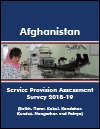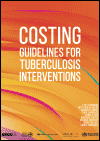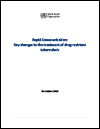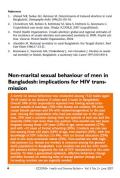What's New
Displaying results 1221 - 1230 of 4911

Resource | Publications,
The 2018-19 Afghanistan Service Provision Assessment focused on tertiary/specialty and private hospitals. The assessment was conducted between November 2018 and January 2019. The overall goal of the survey was to gather information on the availability, readiness, and quality of health services in national specialty and provincial/regional hospitals, including major private sector hospitals in seven major urban areas (Kabul, Herat, Balkh, Kandahar, Nangarhar, Kunduz, Paktya). The assessment focused on specific service areas within the hospitals, which included family planning, maternal and child health, surgery, pediatrics, emergencies, intensive care, delivery, and newborn care. The findings will serve as a baseline for monitoring these services and progress over time.

Resource | Publications,
The overall objective of the 2017-18 PDHS was to collect high-quality data on fertility levels and preferences, contraceptive use, maternal and child health, infant mortality levels, immunisation, nutritional status of mothers and children, disability, migration, women’s empowerment, domestic violence, awareness and behaviour regarding HIV/AIDS, and other health-related issues.
The primary goal was to provide information needed by health and family planning programmes for evidence-based planning and to offer guidelines to programme managers and policymakers so that they can effectively plan and implement future interventions. The 2017-18 PDHS also provides updates on data already collected through censuses and other sources.

Resource | Guidelines,
These guidelines are intended for experienced producers of cost data who may know less about how to cost TB services. This manual is TB-specific and allows costing work to be adapted to context and purpose. While this guidance can be used for those who have not costed health services previously, where this is the case we would advise using the Reference Case as a complementary resource.

Resource | Publications,
Providing evidence-based guidelines to inform public health service delivery for Member States and other stakeholders is one of the core responsibilities of the World Health Organization (WHO). To support countries in responding to the challenges of TB and drug-resistant TB, the WHO Global TB Programme regularly issues evidence-based guidelines using the international GRADE4 (Grading of Recommendations, Assessment, Development and Evaluation) approach for scientific evidence assessment.

Resource | Publications,
The HIV/AIDS situation in Cambodia is one of the most critical the world faces. However, it can also be considered one of the most successful turn-around stories, evidenced by the reduction of the number of new HIV infections by 67 percent since 2005.
In the last decade, availability of and access to comprehensive care and treatment services has been dramatically increased,and Cambodia has achieved critical success in reaching one of its millennium development goals in the significant progress in preventing and mitigating the impact of HIV and AIDS.
This report outlines the work the Cambodian HIV/AIDS Education and Care (CHEC) has done to achieve project goals and to think strategically about future plans.

Resource | Publications,
This report analyses Sustainable Development Goals (SDGs) trends as well as data availability for monitoring progress in Asia and the Pacific and its five subregions. It assesses progress towards the SDGs and the gaps which must be closed for these to be achieved by 2030. This assessment is designed to ensure the region’s actions remain on target, shortcomings are addressed as they arise, and all interested parties remain engaged. It is an invaluable resource for all stakeholders involved in prioritisation, planning, implementation and follow-up of the 2030 Agenda for Sustainable Development in Asia and the Pacific.

Resource | Publications,
A survey on sexual behaviour was conducted among 7122 males (aged 18-49 years) in six districts (three urban and three rural) in Bangladesh. Overall 18% of the respondents reported ever having sexual intercourse outside of marriage (10% with female sex workers, 9% with casual female partners and 2% with males/transgenders) in the past year.
There are limited data on the sexual behaviour and sexual networks of males in the general population and understanding these behaviors and networks may help identify potential trends and patterns of HIV transmission in the country. This study aimed to estimate the prevalence of various non-marital sexual behaviours of males in the community. It also investigated variation of such behaviours among different socio-demographic groups.

Resource | Fact Sheets,
In December 2018, there were 877 new HIV confirmed positive individuals reported to the HIV/AIDS & ART Registry of the Philippines (HARP). Fifteen percent (128) had clinical manifestations of advanced HIV infection (WHO clinical stage 3 or 4) at the time of diagnosis.

Resource | Fact Sheets,
On Zero Discrimination Day this year, UNAIDS is highlighting the urgent need to take action against discriminatory laws.
In many countries, laws result in people being treated differently, excluded from essential services or being subject to undue restrictions on how they live their lives, simply because of who they are. Such laws are discriminatory—they deny human rights and fundamental freedoms.

Resource | Publications,
In many countries, initiatives that aim to improve adolescent (1) sexual and reproductive health (ASRH) implement projects without well thought out plans for evaluation. A range of reasons help explain this phenomenon, including a limited of training and understanding of the value of evaluation and dedicated evaluation resources within implementing and technical entities.





